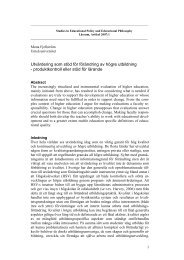Är det alltid rätt person som vinner? - DiVA
Är det alltid rätt person som vinner? - DiVA
Är det alltid rätt person som vinner? - DiVA
You also want an ePaper? Increase the reach of your titles
YUMPU automatically turns print PDFs into web optimized ePapers that Google loves.
SUMMARY<br />
Background and purpose<br />
In the field of sports the results are of great importance. The results are<br />
the essence in competitive sports, and success or failure can change<br />
life overnight for elite athletes. Many times the difference between<br />
winning and loosing can be very marginal, looking at the time or<br />
points difference but still the result will have a big impact. To finish<br />
second, even if it's an Olympic game, can be felt like a failure for the<br />
athlete. Following citation shows an example of this through the<br />
feelings of the rhythmical gymnast, Oksana Skaldina, during the 1992<br />
Olympics:<br />
Winning the bronze medal instead of the gold seemed like a catastrophe<br />
to me, a collapse of all my hopes and planes. (Catalano, R. 1999).<br />
In the light of this the quality of the measurements and the judgements<br />
in sports are an extremely important issue. What does these results<br />
really stand for? What is measured and judged and how good are those<br />
measurements and judgements? From a scientific perspective, evaluation<br />
of measurements is often <strong>det</strong>ermined by reliability and validity.<br />
Reliability as the consistency, and stability in the measurement, and<br />
validity as how relevant the measurement is. With the big importance<br />
of the results in competitive sports today it’s both important and<br />
interesting to look at the reliability and validity of the measurements<br />
and judgements in sports. The reliability problem is often seen and<br />
discussed in so called judging sports, sports where judges are deciding<br />
the outcome of the competition. Reliability in judging sports means<br />
that the different judges come up with exactly the same results independent<br />
from the other judges. The reliability depends partly on the<br />
ability of the judge to interpret the rules and, partly on the ability to<br />
make correct judgements based on these rules. In sports, where<br />
different judges are judging one performance, there are often rules for<br />
how much the points from the different judges are allowed to differ,<br />
65















